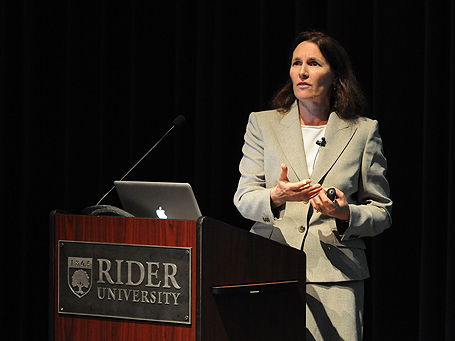Wednesday, Oct 27, 2010
Visiting professor Dr. Melanie Killen explained more emphasis needs to be placed on studies concerning younger children in order to better understand stereotypes and its origins.
by Meaghan Haugh
While extensive research exists about stereotypes and prejudice, most studies derive from college populations, visiting professor Dr. Melanie Killen explained during a recent lecture on Rider University’s Lawrenceville campus. In order to understand stereotypes and its origins, more emphasis needs to be placed on studies concerning younger children, Killen asserted.
Killen, a professor of Human Development and associate director for the Center for Children, Relationships, and Culture at the University of Maryland, has received funding from the National Institute of Child Health and Human Development and the National Science Foundation for her research on children’s and adolescents’ moral development, social reasoning about exclusion, intergroup bias, prejudice, and the development of social cognition.
She shared her research during a lecture entitled “The Origins of Stereotyping and Prejudice” on October 20 as part of Rider’s fourth annual Marvin W. Goldstein Lecture on Prejudice Reduction.
Child development research explores peer interactions and moral judgment or issues of fairness among children. Killen said while research shows that young children do have a sense of fairness and equal treatment, most problems in peer interactions are related to aggression, bullying and peer rejection.
“Not all forms of peer rejection reflect individual differences. Some children, between the ages of 5 and 8, reject gender, race, culture and ethnicities,” she said. “Stereotypes and ingrained biases do exist early in children, but at what point do they think that is wrong?”
To illustrate, Killen shared a number of studies concerning child development research with the audience. In one particular study, preschool children were videotaped with no adults present while playing with toys. Some of the children did not have any toys to play with, while others had more than one. Some of the children expressed that it was “not fair” that some had more than others and that they should share.
“Young kids understand why it’s wrong to hit and why they should share,” Killen said. “These ideas about psychological harm, including teasing and excluding, that’s harder for children to understand.”
In another study, preschool children were interviewed about gender exclusion. According the study, which included a sample of preschool children, 87 percent of sample said it was unfair to exclude a boy from doll playing or to exclude a girl from truck playing.
“Kids are making judgments on fairness, so maybe they are starting to think about prejudice,” Killen suggested.
Killen also shared the benefits of cross-race friendships, which increase the use of moral reasoning and fairness, and challenge stereotypes. Killen said intergroup contact with members of the “out group” under the right conditions can decrease prejudice. These conditions include opportunities for cross-race friendship, equal status and authority sanction, or when a school principal is on board to support those things. Cross-race friendships significantly decrease with age, she said.
The Marvin W. Goldstein Endowed Lecture Series on Prejudice Reduction, presented by the Department of Psychology, brings researchers and professors from the field of psychology to Rider each fall to discuss issues related to prejudice; cultural, racial and gender bias. The endowed lecture series honors the 38-year career of Marvin W. Goldstein, Ph.D., a member of the Rider University Department of Psychology and the co-director of The Julius and Dorothy Koppelman Holocaust and Genocide Resource Center at Rider.
Dr. Anne Law, chair of the Department of Psychology at Rider, said the department hoped that Killen’s lecture would enable the audience to understand more about how children think and act toward others.
“It’s our hope that this understanding would be used in ways that can reduce prejudice and create a more tolerant society,” Law said.

